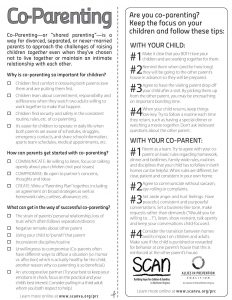
Arlington School Support Line
June 15, 2021
Our friends at Arlington Public School and Cigna have partnered up to provide a school support line linking vital resources for crisis and referral support…
June 7, 2016
 Co-Parenting—or “shared parenting”—is a way for divorced, separated, or never-married parents to approach the challenges of raising children together even when they’ve chosen not to live together or maintain an intimate relationship with one another. Managing this partnership can pose special challenges but the rewards for our children are invaluable.
Co-Parenting—or “shared parenting”—is a way for divorced, separated, or never-married parents to approach the challenges of raising children together even when they’ve chosen not to live together or maintain an intimate relationship with one another. Managing this partnership can pose special challenges but the rewards for our children are invaluable.
Millions of families in this country struggle with the reality of divorce, and many additional unmarried parents are working to raise children together. But regardless of their relationship with one another, it’s critical that caregivers put their children first and commit to co-parent.
Children benefit from knowing they have been put first by BOTH parents. They find comfort in knowing BOTH parents love them and want to spend time with them and are willing to work together to make that happen. There is an important sense of security and safety for children in consistent routine, rules, etc.
It’s easier for a child to operate in daily life when both parents are aware of schedules, struggles, emergency contacts, etc. (be sure to share school information, sports team schedules, medical appointments, etc.)
Co-parenting is NOT easy – especially if your personal relationship is strained. There is often a loss of trust between divorced or separated parents, and now it must be re-built in relation to your child. Remember that parents should never talk badly about one another in front of their child. Remember – your child loves (and is a part of) BOTH of you and could feel guilty/responsible for your negative emotions toward the other.
Do NOT use your child – never keep your child away from his or her other parent to “punish” that parent. If you provide inconsistent discipline (or an overwhelming amount of gifts, freedom, etc.) in an attempt to spoil your child or make them like you more, it can create an unhealthy, unproductive bond with your child, and put incredible strain on your child’s and your relationship with the other parent.
There is a difference between parenting “styles” and parenting “strategies.” Two parents often have different ways to diffuse a situation (i.e. humor vs. affection) which is actually healthy for child (another reason co-parenting is so beneficial). The key—after the style of reaction—is to agree on the strategy (timeout, loss of privilege, etc.) so it’s consistent no matter who is parenting.
There is no perfect way to co-parent. Parents should be flexible – if a parent is incarcerated or stationed overseas or not living n the U.S., for example, focus on sharing information about your child as much as possible, give them as much time as possible via phone, email, etc. You might also consider the idea of co-parenting with others who are responsible for/raising your child (such as a grandparent) to provide a sense of security.
It can be very hard to convince someone who feels the anger and betrayal of a divorce or separation to work with you. So what can a parent do when trying to engage their former partner in co-parenting?
Work to keep your emotions in check, and focus on the practical steps and your child’s best interest. Consider pulling in a third adult who you both respect (friend, family member, pastor, counselor) to help you negotiate and put your child first.
Parenting is a difficult job even in the best of circumstances, so when two unmarried adults are co-parenting, the challenges might seem to multiply on a daily basis! By making the commitment to raise your children together—even while living part—you show them that THEY are the priority in your lives and you are willing to do what it takes to support them and keep them safe. There are many co-parenting classes and support groups in our region; reach out for support to make the best decisions for your child!